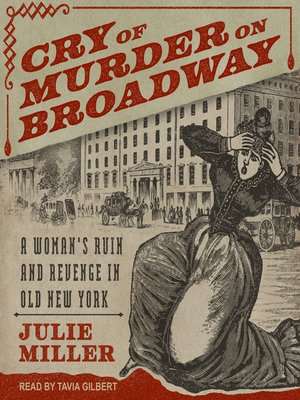Cry of Murder on Broadway
audiobook (Unabridged) ∣ A Woman's Ruin and Revenge in Old New York
By Julie Miller

Sign up to save your library
With an OverDrive account, you can save your favorite libraries for at-a-glance information about availability. Find out more about OverDrive accounts.
Find this title in Libby, the library reading app by OverDrive.



Search for a digital library with this title
Title found at these libraries:
| Loading... |
On the evening of November 1, 1843, a young household servant named Amelia Norman attacked Henry Ballard, a prosperous merchant, on the steps of the new and luxurious Astor House hotel. Agitated and distraught, Norman followed Ballard down Broadway before confronting him at the door to the Astor House. Taking out a folding knife, she stabbed him, just missing his heart. Ballard survived the attack, and the trial that followed created a sensation. Newspapers in New York and beyond followed the case eagerly, and crowds filled the courtroom every day. Prominent author and abolitionist Lydia Maria Child championed Norman and later included her story in her fiction and her writing on women's rights. The would-be murderer also attracted the support of politicians, journalists, and legal and moral reformers who saw her story as a vehicle to change the law as it related to "seduction," and advocate for the rights of workers. Cry of Murder on Broadway describes how New Yorkers, besotted with the drama of the courtroom and the lurid stories of the penny press, followed the trial for sensation. Throughout all this, Norman gained the sympathy of New Yorkers, in particular the jury, which acquitted her in less than ten minutes.






